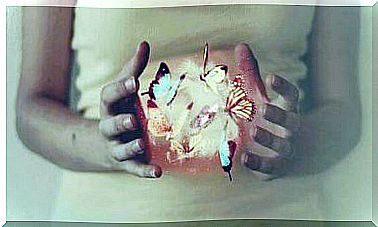How Cognitive Distortions Affect Us

In this article, we will take a look at some mechanisms that affect us all. They play a very important role in our lives but often go unnoticed. Before we go into how cognitive distortions affect us, however, let’s take a look at a testimony from a patient at a psychologist:
“Every time I get depressed, I feel like I’ve been hit by a sudden cosmic shock. I’m starting to see things differently. The change can take place in less than an hour.
My thoughts become negative and pessimistic. When I think about my past, I feel convinced that nothing I have done has been worth anything. All happy moments seem like an illusion. My achievements seem as real as the scenery in a western movie.
I end up convincing myself that my true personality is useless and insignificant. It’s impossible to get a job done because I’ve paralyzed by doubt. I can not stand still, the suffering is unbearable. “

This patient suffered from symptoms of depression. He may also have talked about symptoms of anxiety, but that’s not the point. The important thing here is that these symptoms are the product of a situation, an event or something that happened. Or not.
We tend to say that we feel a certain way because a specific “thing” happened. It is as if something carries us from one point to another without us having anything to say about.
This is because we tend to skip our thoughts and the things we say to ourselves after the incident.
The role that thoughts and inner dialogue play is fundamental to understanding our emotional states at a given moment. Our thought patterns have just as much influence (or more) on how we feel as the event itself.
If we use a cooking metaphor, the way we chew the food can affect the tastes just as much as the composition of the food.
The negative thoughts that invade our mind are the true causes of our emotions. The opposite is also true. If we want to manage our emotions well, our thoughts must be the starting point.
I would like to suggest a little exercise. Every time you feel depressed about something, try to identify the thought at that very moment. Because thoughts create our mood, we can change our mood if we change our thoughts.
Some people will feel skeptical. This is because their negative thought patterns have become such a strong part of their lives that they go on autopilot.
Many thoughts pass fleetingly and automatically through our senses, and we are not aware of them. They are as obvious and natural as holding a fork.
It is a neurological fact that before we experience something, our mind will process and give it meaning. It can be conscious or unconscious. In general, our thoughts are nourished by our inner dialogue. It is as they have long said:

Rational means something that is true, logical, pragmatic and based on reality (that is at least the definition we will use). Such rational thought helps people achieve their goals and fulfill their purpose (Ellis, 1979a).
Irrational, on the other hand, is what is false, illogical, not based on reality, and something that makes it difficult for people to achieve their goals and purposes in life (again, this is the definition we use in this article). Irrational things disrupt our lives and happiness (Ellis, 1976).
Albert Ellis was a psychologist and the ancestor of cognitive therapy. He identified a series of basic irrational ideas that most people have. Let’s take a look at some examples:
- The adult has an extreme need for love and recognition from virtually every significant person around him.
- The fact that things do not go the way you want is horrific and catastrophic.
- Accident is caused by external forces. People have a limited or insignificant ability to control their anxiety and difficulties.
- Some people are disgusting, evil and abominable. Society should seriously blame and punish them for their evil deeds.
There are many more irrational ideas, but we will not list them all. Our focus today is, as I said, how cognitive distortions affect us.

Our culture bombards us with irrational thoughts. We find irrational thoughts in songs, movies and TV series. We assimilate, or have already assimilated, these thoughts into our belief systems.
I’m not trying to say we should stop watching TV or listening to music. Nor do I suggest that we distance ourselves from society.
But we should question what we see and hear. It is important to put a question mark around these ideas before we add them to our beliefs and values.
Cognitive distortions affect us because they are distorted perceptions of the world around us. These erroneous thoughts tend to be automatic, and it is difficult for us to notice that we have them.
That’s why it can be so helpful to see a psychologist. Once we have identified them, the next step is to replace the distortions with more “realistic” or adaptable thoughts.
Basically, cognitive distortions are responsible for our grief, anxiety, anger, etc. When we identify and change them, we will feel better.

All or nothing
With this type of distortion, we perceive everything in extremes. There is no happy middle ground. This is a typical thought pattern characterized by “all or nothing” and “black or white”.
We think things can be good or bad. We are either perfect or total failure. For example: “if I’m not successful in everything I do, I’m completely useless.”
Overgeneralization
This is when we draw general conclusions from specific events. In other words, we believe that something will happen over and over again just because it happened once.
For example, if a girl does not respond to a boy’s interest, he believes that all women will reject him in the future.
Filtration
This is when a person chooses a negative detail in a situation and focuses entirely on it. Through this filter, he gets a negative attitude towards the whole situation.
An example might be a wife who always mentions how disorganized her husband is, without ever mentioning his positive traits. She does not say that he is responsible, hardworking, affectionate, etc.
Mind reading
This is about assuming that you know what other people’s reasons or intentions are. You see your interpretations as the only valid ones, when in fact there are many possibilities. You think you can guess exactly what others think, but you are usually wrong.
This means that you draw hasty conclusions prematurely. For example: “she does not pay attention to me, so she is not interested in what I say.” This is one of the most common ways that cognitive distortions affect us in relationships.
Personation
A tendency to relate something external to yourself. In other words , you think everything revolves around you. This makes you try to twist the fact.
Another type of personification is when we compare ourselves to others. For example, if someone makes a general comment that people are irresponsible, we think the comment is directed at us. A person who is particularly sensitive to personification believes that he is constantly the target of insinuations.
Emotional thinking
At the core of the distortion, we find the belief that what the person feels must be true. We take our own feelings as evidence of the truth, even though we lack objective information. For example: “if I feel like a loser, it’s because I’m a loser.”
To draw hasty conclusions
To draw hasty conclusions without having all the information we need. It ends with an arbitrary and unfounded conclusion. For example: ” I’m sure my family will not like the food I stock.”
Magnification and minimization
Magnification occurs when we focus on our mistakes, fears or imperfections, and exaggerate their weight. “My God, I made a mistake. How horrible! It’s horrible! ”
Minimization occurs when we minimize our properties. “I’m not good enough or smart enough for math. Getting 90 on the test proves nothing. ”
Borden
With this distortion, the person acts in accordance with inflexible rules. These rules should dictate everyone’s relationships. The words that indicate that cognitive distortions affect us in this way are “should” or “must”.
The person judges not only others according to these rules, but also himself. For example: “others should understand me, they should not treat me like that” or “you should not act like that…”
Labels
This is another type of overgeneralization. Instead of identifying the mistake we made, we give ourselves a negative label, as a “loser”. When we do not like someone else’s behavior, we give him a label: “he is a damned liar.”

The best way to avoid cognitive distortions affecting us is as follows:
- Realize when you feel bad
- Identify the thoughts in your mind in that moment
- See if they correspond to any of the cognitive distortions we mentioned
- Replace these thoughts with healthy thoughts. Modify your language and your inner dialogue
Cognitive distortions affect us all at some point in life. Maybe you’re even a victim right now. The better we understand them and how they affect us, the better we can control their effect and use them to our advantage.
Bibliography
- David D. Burns (1980), Sentirse bien. A therapy against depression, Barcelona: Paidós.
- Isabel Caro Gabalda (2007), Theoretical-Practical Manual of Cognitive Psychotherapies , Bilbao: Descleé de Brouwer.
- Albert Ellis (1992), Manual of Therapeutic Emotional Therapy , Bilbao: Descleé de Brouwer.
- J. Jesús Montes Cortés (2006), Manual for the way of irrational thinking , Guadalajara: Universidad.








